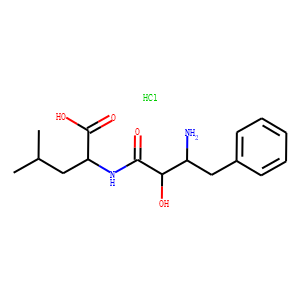| Reference | 1. Drug Des Devel Ther. 2019 Sep 12;13:3217-3228. doi: 10.2147/DDDT.S218371. eCollection 2019.<br />
Ubenimex induces apoptotic and autophagic cell death in rat GH3 and MMQ cells through the ROS/ERK pathway.<br />
Wang Y(#)(1), Pang B(#)(2), Zhang R(1), Fu Y(3), Pang Q(1).<br />
Author information:<br />
(1)Department of Neurosurgery, Shandong Provincial Hospital Affiliated to Shandong University, Jinan 250021, Shandong, People's Republic of China. (2)Department of Neurosurgery, Shandong University, Jinan 250021, People's Republic of China. (3)Department of Obstetrics and Gynecology, Shandong Provincial Hospital Affiliated to Shandong University, Jinan 250021, Shandong, People's Republic of China. (#)Contributed equally<br />
Purpose: Ubenimex, an aminopeptidase N (APN) inhibitor, is widely known for its use as an adjunct therapy for cancer therapy. However, in recent studies, it has also conferred antitumour effects in many cancers, but its anticancer mechanism is largely unknown. This study aims to investigate the specific anticancer activities and mechanisms of ubenimex in GH3 and MMQ cells.<br />
Materials and methods: In this study, we investigated the anticancer effects of ubenimex in GH3 and MMQ cells. Cell viability and cell death were assessed by the Cell Counting Kit-8 kit (CCK-8) and a LIVE/DEAD cell imaging kit. Apoptosis and intracellular reactive oxygen species (ROS) generation were assessed by flow cytometry and fluorescence microscopy. Autophagosome formation was detected by transmission electron microscopy, and autophagic flux was measured with mRFP-GFP-LC3 adenoviral transfection. The protein expression level was detected by Western blotting.<br />
Results: The results revealed that treatment with ubenimex induced apoptotic and autophagic cell death in GH3 and MMQ cells, which resulted in decreased viability, an increased proportion of apoptotic cells, and autophagosome formation. Further experiments showed that ubenimex induced ROS generation and activated the ROS/ERK pathway. The ROS scavenger NAC could attenuate ubenimex-induced apoptosis and autophagy.<br />
Conclusion: Our studies revealed that ubenimex exerted anticancer effects by inducing apoptotic and autophagic cell death in GH3 and MMQ cells, rendering it a possible effective adjunctive therapy for pituitary treatment.<br />
<br />
2. Biomed Res Int. 2019 Feb 20;2019:4390839. doi: 10.1155/2019/4390839. eCollection 2019.<br />
Ubenimex Reverses MDR in Gastric Cancer Cells by Activating Caspase-3-Mediated Apoptosis and Suppressing the Expression of Membrane Transport Proteins.<br />
Guo Q(1), Jing FJ(2), Qu HJ(1), Xu W(1), Han B(1), Xing XM(1), Ji HY(1), Jing FB(1).<br />
Author information:<br />
(1)Department of Clinical Pharmacy, The Affiliated Hospital of Qingdao University, Qingdao, Shandong, 266003, China. (2)Department of Oncology, The Affiliated Hospital of Qingdao University, Qingdao, Shandong, 266003, China.<br />
Gastric cancer (GC) is one of the most malignant tumors, accounting for 10% of deaths caused by all cancers. Chemotherapy is often necessary for treatment of GC; the FOLFOX regimen is extensively applied. However, multidrug resistance (MDR) of GC cells prevents wider application of this treatment. Ubenimex, an inhibitor of CD13, is used as an immune adjuvant to treat hematological malignancies. Here, we demonstrate that CD13 expression positively correlates with MDR development in GC cells. Moreover, Ubenimex reverses the MDR of SGC7901/X and MKN45/X cells and enhances their sensitivity to FOLFOX, in part by decreasing CD13 expression, which is accompanied by downregulation of Bcl-xl, Bcl-2, and survivin expression; increased expression of Bax; and activation of the caspase-3-mediated apoptotic cascade. In addition, Ubenimex downregulates expression of membrane transport proteins, such as P-gp and MRP1, by inhibiting phosphorylation in the PI3K/AKT/mTOR pathway to increase intracellular accumulations of 5-fluorouracil and oxaliplatin, a process for which downregulation of CD13 expression is essential. Therefore, the present results reveal a previously uncharacterized function of CD13 in promoting MDR development in GC cells and suggest that Ubenimex is a candidate for reversing the MDR of GC cells.<br />
<br />
3. Onco Targets Ther. 2018 Feb 22;11:943-953. doi: 10.2147/OTT.S157480. eCollection 2018.<br />
Role of ubenimex as an anticancer drug and its synergistic effect with Akt inhibitor in human A375 and A2058 cells.<br />
Wang X(1), Liu Y(1), Wu R(1), Guo F(1), Zhang L(1), Cui M(1), Wu X(1), Zhang Y(2), Liu W(1).<br />
Author information:<br />
(1)Department of Pediatric Surgery, Shandong Provincial Hospital affiliated to Shandong University, Jinan, People's Republic of China. (2)Department of Dermatology, Shandong Provincial Qianfoshan Hospital affiliated to Shandong University, Jinan, People's Republic of China.<br />
Background: Malignant melanoma (MM) is a malignant tumor produced by changes in melanocytes in the skin or other organs. In the classification of skin tumor mortality, skin melanoma ranks the highest. Ubenimex, an Aminopeptidase N (APN) inhibitor, is now widely used for cancer as an adjunct therapy, conferring antitumor effects. Apoptosis and the induction of autophagy have both been found to be closely associated with tumor cell death.<br />
Methods: In this study, the A375 and A2058 cell lines were treated with ubenimex. Cell viability was measured using the Cell Counting Kit 8 assay. Apoptosis and autophagic cell death were assessed using flow cytometry and acridine orange/ethidium bromide staining. Protein expression was assessed by Western blot analyses and immunofluorescence. Matrigel invasion and migration assays were used to examine the metastatic ability of melanoma cells.<br />
Results: The results revealed that ubenimex inhibited the expression of APN in melanoma cells, which may be connected with the inhibition of metastasis. In addition, it increased melanoma cell death by inducing apoptosis and autophagic cell death. This effect was accompanied by increased levels of p-JNK. Moreover, treatment with ubenimex induced protective Akt activation, and combined use of an Akt inhibitor with ubenimex provided a better effect for inducing tumor cell death.<br />
Conclusion: As an effective anti-tumor drug in vitro, ubenimex might be an excellent adjunctive therapy for the treatment of melanoma, with greater effects when combined with the use of an Akt inhibitor.<br />
|

